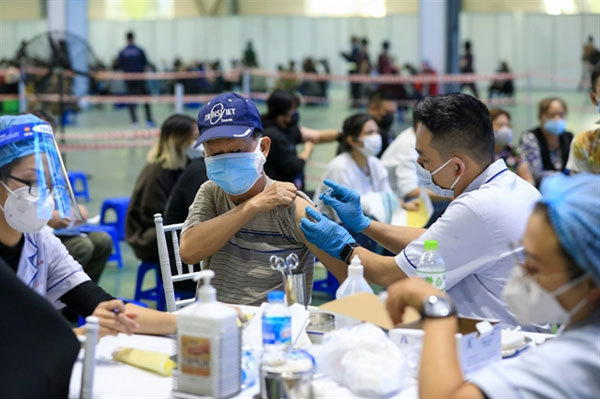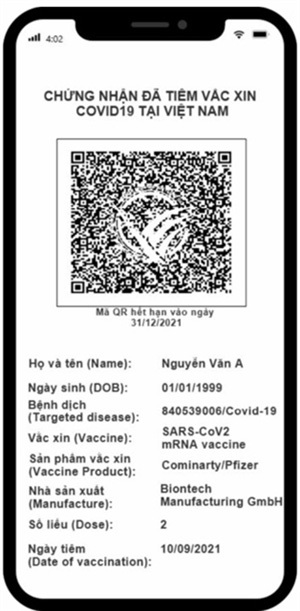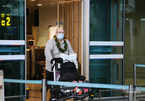 |
| Elderly people receive COVID-19 vaccination in Hoan Kiem District, Hanoi. — VNA/VNS Photo Thanh Dat |
The COVID-19 vaccine certificates are to be issued for people who have received the primary course of one of eight types of COVID-19 vaccines licensed for use in Vietnam by the health ministry: AstraZeneca’s Vaxzevria, Gamaleya Research Institute’s Sputnik V, Sinopharm’s Vero Cell Inactivated along with the manufactured-in-UAE version Hayat-Vax, Pfizer/BioNTech’s Comirnaty, Moderna’s Spikevax, Johnson & Johnson’s Janssen, and Cuba Centre for Genetic Engineering and Biotechnology (CIGB)’s Abdala.
The QR code-based passport will be valid for 12 months.
 |
| An example of Vietnam's COVID-19 vaccine passport, which the health ministry said will follow EU's digital COVID-19 vaccine certificates. — Photo from the Ministry of Health |
The vaccine passports have 11 fields of information: name, date of birth, nationality, targeted disease, doses of vaccines received, date of vaccination, lot number of the vaccine batch, type of vaccine, vaccine product received, the vaccine manufacturer, and a code for the certification.
The name and date of birth will be integrated with other personal identification documents (passports or citizen identification cards).
Information in the targeted disease, vaccine, vaccine product or manufacturer will be compatible with the values provided for in the World Health Organisation’s "COVID-19 vaccine tracker and landscape" and "Value sets for EU Digital COVID Certificates" issued by the European Union.
National epidemic prevention and control apps (like PC-COVID or the e-health app Sức khoẻ điện tử) and other utility apps (if given permission by the individual users) could receive and store the vaccination certificates in the form of a QR code according to instructions for medical data sharing as regulated by the Ministry of Health.
The issuance of the vaccine passports is applied uniformly across vaccination sites in the country, following three-step procedures, according to the Ministry of Health.
First, vaccination sites are asked to review and verify the information of people to whom they have administered vaccines.
Second, vaccination sites will conduct ‘digital signing’ of vaccination records on the national platform for COVID-19 vaccination management used by health authorities, which will share its data with the management system for certification of vaccinations against COVID-19.
Third, the Department of Preventive Medicine (Ministry of Health) digitally signs the COVID-19 vaccine certificates. The certificates are then issued using QR codes in accordance with EU regulatory standards.
By the end of December 20, Vietnam has administered over 140 million doses of COVID-19 vaccines, with over 130 million given to the adult population (69.1 million first dose, nearly 60 million second doses, and upwards of 1 million third doses for Cuban Abdala vaccines), along with 40,524 additional doses and 241,237 booster shots.
First-dose coverage in the adult population hits 96.9 per cent and the fully vaccinated portion reaches 83.6 per cent.
A total of 9.2 million doses have been administered for children aged 12-17, including 6.7 million first doses and 2.5 million second doses.
First-dose coverage in this age group hit 73.4 per cent, and 28.2 per cent have been fully vaccinated.
Vietnam only clears Pfizer and Moderna vaccines for children aged 12-17.
|
Vaccine passport recognition Regarding the process of recognising COVID-19 vaccine passports, earlier this month, the Ministry of Foreign Affairs said it had discussed with about 80 partners on mutual recognition of the passports. The Vietnamese authorities were also urgently completing related software solutions to soon issue a vaccine passport form meeting international standards. As of early December, Japan, the US, the UK, Australia and Belarus had recognised Vietnam’s vaccination certificate with a number of specific standards on vaccine types. India and Canada had agreed with Vietnam in principle, while other partners, including ASEAN, the EU, China and the Republic of Korea, were actively considering Vietnam’s proposals and waiting for the nation’s introduction of its vaccine passport format. Vietnam has recognised the vaccination certificates of 78 countries and territories, which were officially introduced by the foreign ministry. The country is set to resume regular international flights on a pilot basis starting January 2022. |
Source: Vietnam News

Ministries create vaccine passport for international authentication
The Ministry of Health is joining forces with the Ministry of Information and Communications to create a vaccine passport form (QR Code connection system for international authentication).

Hanoi, 11 localities discuss removing checkpoints, creating ‘green tourism corridor’
Resumption of safe travel under a ‘tourism bubble’ between Hanoi and 11 cities and provinces is facing challenges.